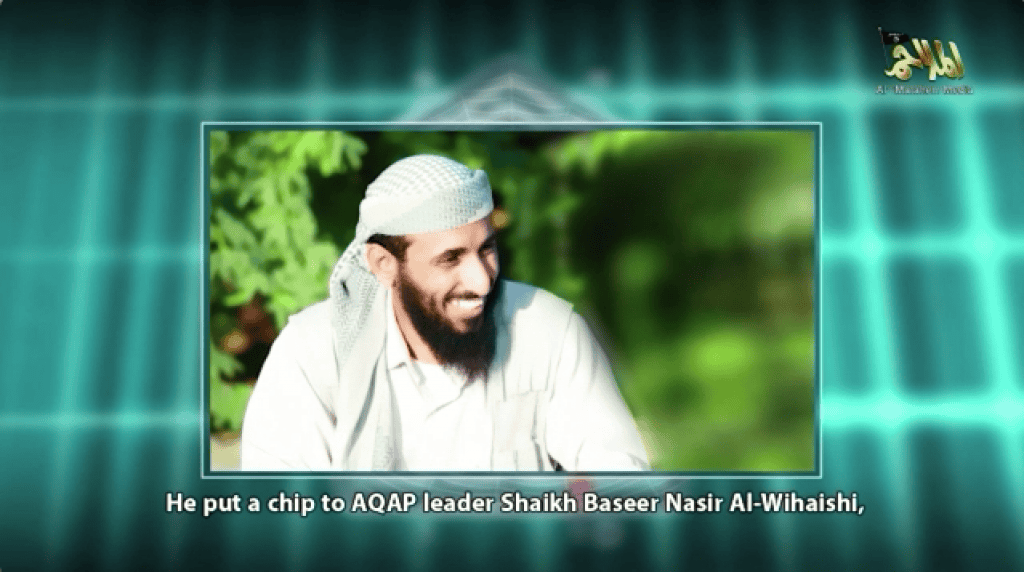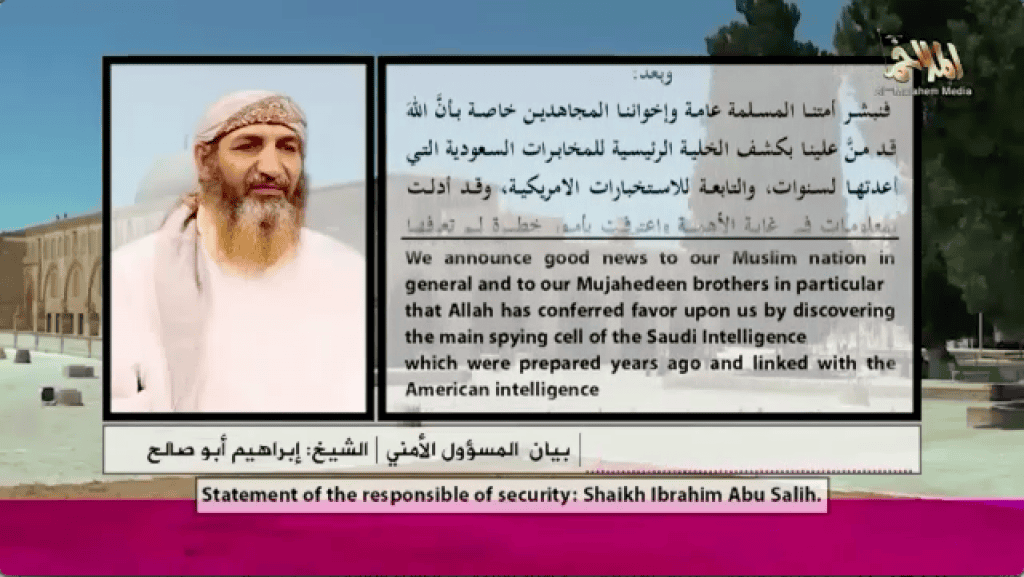
Al Qaeda in the Arabian Peninsula (AQAP) has released a lengthy video documenting its efforts to uproot an alleged Saudi spy network that helped hunt down some of the group’s most senior figures. The production is titled, “The Preliminary Introduction [to] Demolishing the Espionage,” and is intended to be the first in a series.
FDD’s Long War Journal cannot independently verify the claims made in the video. Some details conflict with published reports. But it is noteworthy that AQAP is blaming the Saudis for some of its high-profile leadership losses.
The video includes footage of several men who were supposedly recruited by Saudi intelligence to help spy on AQAP. The men were told to place “chips” in or near various personalities, who were then targeted in drone strikes. AQAP lists dozens of jihadis as victims of the spy campaign.
One alleged spy is identified as Abu Turab al-Sudani, a Sudanese man who says he was recruited by Saudi intelligence in 2011 and dispatched to Yemen. According to Sudani’s account, a Saudi intelligence officer known as Abu Khalid gave him a carpet that had a tracking chip in its corder. Abu Khalid told Sudani to give the carpet to “Sheikh Basir” or “Sheikh Kasim” if he had the opportunity.

AQAP claims a Saudi spy helped the US target Nasir al-Wuhayshi, but other reports say he was killed in a “signature strike.”
Basir (or Baseer) is Nasir al-Wuhayshi, a key jihadist who helped relaunch AQAP in early 2009 and led the group for several years thereafter. Wuhayshi served as the aide-de-camp for Osama bin Laden prior to the 9/11 hijackings and was eventually named al Qaeda’s deputy emir, second only to Ayman al Zawahiri in the group’s management. Wuhayshi was killed in a US drone strike in June 2015. Sheikh Kasim is almost certainly Qasim al-Raymi, Wuhayshi’s comrade and successor as AQAP leader.
Sudani claims in the new video that the Saudis’ chip-laden carpet was used to locate and kill Wuhayshi. In broken English, the video’s editors emphasize this point, claiming Sudani “put a chip to [sic] AQAP leader” Wuhayshi, as well as the “brothers Farouq al-Qaseemi and Abu Omar al-Pakistani,” among others.
However, the Washington Post reported at the time of Wuhayshi’s death that the CIA did not know he was at the location that was bombed. Instead, Wuhayshi was reportedly killed in a “signature strike.” Such bombings are launched based on data about the jihadis’ movements and activities, rather than intelligence that a specific terrorist or militant is located at particular spot at a precise time.

AQAP claims Saudi spies helped the US track down Ibrahim al-Rubaish, too.
Regardless, AQAP blames the Saudi spy network for not only Wuhayshi’s death, but also dozens of others. These spy operations supposedly assisted the US in the air strikes that killed Ibrahim al-Rubaish and Abu Huzayfa al-Ghamdi (a.k.a. Othman Ahmad Othman al-Ghamdi). Both Rubaish and Ghamdi were former Guantanamo detainees who became AQAP leaders. Rubaish served as one of AQAP’s most influential ideologues, among other duties, while Ghamdi was a military commander.
According to AQAP, another purported victim of the Saudi spy network was Ma’moun Abdulhamid Hatem, an official who initially encouraged the al Qaeda branch to defect to the Islamic State’s cause. Hatem eventually backed away from his pro-Islamic State position. He was reportedly killed in May 2015.
Another alleged spy, Abu Aamir al-Makki (Abd Allah bin Naam al-Sulami), claims in the video that he came to Yemen “to establish a new group other than al Qaeda organization.” The video’s editors clarify that he “was sent to create a new artificial Jihadi group,” which had the “goal” of disrupting the jihadists’ cause and aimed “to distort the image of Jihad.” According to Makki’s and AQAP’s account, the effort didn’t get off the ground, though Makki did reportedly help pinpoint the locations of some jihadists.
It is not clear from the video how these Saudi-implanted chips are supposed to work. At different points, the “spies” claim that they called or contacted their Saudi handlers after making sure the chips were in place, a move that would have increased the risk of detection. Again, FDD’s Long War Journal cannot verify the stories offered in the video.
Al Qaeda veteran claims counterintelligence effort a success, despite deaths
After several “spies” offer their testimony on camera, an al Qaeda veteran and AQAP leader known as Ibrahim Abu Salih comments on the matter.
“We announce good news to our Muslim nation in general and to our Mujahideen brothers in particular that Allah has conferred favor upon us by discovering the main spying cell of the Saudi intelligence which [sic] were prepared years ago and linked with the American intelligence,” Salih says, according to the English transcript accompanying the video. He says the spies “gave extremely important information and confessed serious issues.”
“This great victory is not only assigned to the Mujahideen in the Arabian Peninsula, rather it is for the entire nation,” Salih claims.

A message from Ibrahim Abu Salih is included in a newly-released AQAP video.
Salih’s argument is odd given that, according to AQAP’s own account, the Saudi spy network successfully guided bombs to dozens of the group’s members. In other words, Allah was on AQAP’s side when the “spies” were rooted out, but evidently not when Wuhayshi – one of the most important al Qaeda figures on the planet at the time – was struck down.
Ibrahim Abu Salih (also known as Ibrahim al Banna and Abu al Hassan al Hashimi) was first featured on camera in late 2015, after AQAP’s leadership losses meant the group had lost some of its camera-ready commentators. He had quietly worked to integrate al Qaeda into Yemeni society since the early 1990s. In the new video, he is again identified as the head of AQAP’s security.
Salih claims that AQAP is making these details known now because Muslims “should be acquainted” with what the “traitors have been doing” and be able to combat such tactics.
“So, the brothers in the media committee have prepared a series of documentaries under the title, Demolishing of the Espionage, aiming to enlighten every Muslim,” Salih says. And “every Muslim should stop to reflect deeply and carefully on these documentaries,” because “knowing the ways of how the enemy fights us…will help us to push him, defeat him and gain victory over him.”
Salih addresses the Saudi royals as “the tyrants of the house of Saud,” saying they are “wretched” for employing tactics that weren’t even used against the first Muslims. “Be aware that all your desperate attempts to extinguish the light of Allah, by Allah willing will fail,” Salih claims. “Those traitor spies whom you sent, Allah has exposed them publicly. They have uncovered your plan and displayed your disgraceful act in violating the honors in a way that was not known before, even in the days of ignorance.”
Salih also blasts the Saudis for their “clear loyalty” to the Americans, who are “the disbelievers” and “the wicked ones…bombing the Muslims in Yemen by drones, causing the killing of innocents.”
In the past, Salih says, AQAP was somewhat lenient on captured spies. The group issued pardons for “each one who repents to Allah and surrenders himself to the Mujahideen” and “[s]ome spies benefited from this pardon.” But apparently not all have repented, as “they persisted in their error” and will therefore suffer a different fate. Other footage included in the last third of the video is intended to encourage spies to turn themselves and repent before it is too late.
AQAP repeatedly warns of spies
AQAP has repeatedly warned of spies in its ranks. In Dec. 2017, for instance, the group distributed a circular that included a “complete prohibition on the use of phones and means of communication through the internet.” The order was issued in response to various security threats, which AQAP obviously did not think they could manage without telling its members to cease communicating electronically, at least for a time.
The following month, Jan. 2018, AQAP released a video warning against the spilling of secrets. The video featured Ibrahim Abu Salih, Ibrahim al Qosi (an ex-Guantanamo detainee), and Qasim al-Raymi. [See FDD’s Long War Journal report, Former Guantanamo detainee warns against spilling secrets.]
The new video comes shortly after AQAP was forced to deny an account in the Associated Press, which reported that the UAE and Saudi-led coalition in Yemen had struck deals with the group. These deals have allowed AQAP to preserve its ranks, while fighting on the same side of the war against the Houthis.
The Saudis have reportedly played a role in disrupting AQAP’s terrorist operations in the past. In 2010 and early 2011, media reports indicated that still another former Guantanamo detainee, Jabir Jubran al-Fayfi, had returned to Saudi Arabia after joining AQAP’s ranks. According to these reports, Fayfi helped the Saudis and the Americans thwart an AQAP plot to bomb US-bound cargo planes.
Whatever the truth is in this story, which contains many uncertain details, AQAP is clearly concerned that spies will do more damage to its organization.








1 Comment
AQAP is afraid of spies, and that is a good thing. The US should aggressively expand its psyops operations to sow discord, weakness, and disloyalty in the AQP ranks. Conducting psyops is cheap, and the return on investment is very effective. Seldom used are US Commander Solo aircraft which can project TV and radio disinformation, propaganda, and demoralization information onto terrorists, and the local populations. Unfortunately, these aircraft are seldom seen being used.